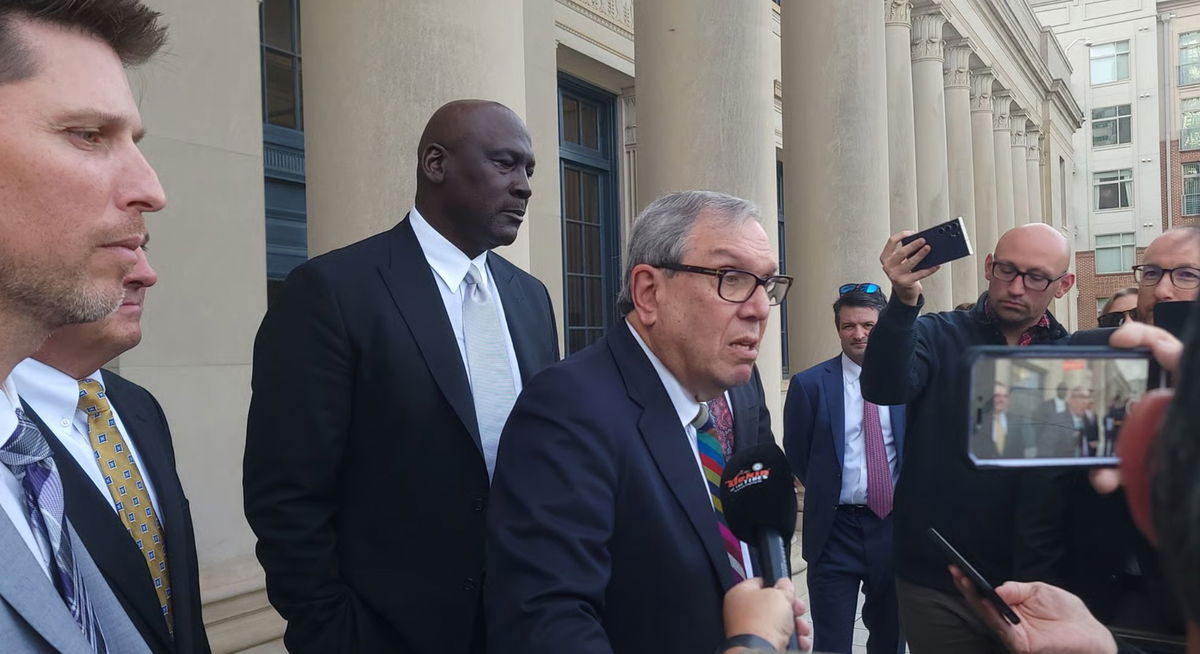

After two days of mediation ended without progress, NASCAR and the two suing teams, 23XI Racing and Front Row Motorsports, have moved past negotiation and into open confrontation. The breakdown has cleared the path for trial preparations, with briefs officially filed. NASCAR’s response amid this offers the clearest picture yet of how it plans to defend itself in court.
Watch What’s Trending Now!
NASCAR fires back at 23XI and Front Row Motorsports
According to a report from Fox Sports’ Bob Pockrass, the sanctioning body accuses teams of seeking “hundreds of millions of dollars in damages that they intend to keep for themselves,” insisting that “there is no evidence to support such an award.”
In its preliminary statement, NASCAR lays out its defense by reminding the court of its long-standing history of collaboration with teams, manufacturers, and partners over eight decades. The organization argues that its success has been “built on hard work, investments, and innovation and not anticompetitive conduct.” It further states, “Plaintiffs will ask a jury to find—but will be unable to prove—that NASCAR holds a monopsony over a proposed (yet ill-defined) market for ‘premier stock car racing teams,’ which Plaintiffs contend NASCAR willfully maintained through anticompetitive conduct in violation of Section 2 of the Sherman Act.”
Trial briefs are due today in 23XI/FRM-NASCAR case. NASCAR: “Plaintiffs will ask the jury to award them hundreds of millions of dollars in damages that they intend to keep for themselves. There is no evidence to support such an award.” … From opening page: pic.twitter.com/Atuz4QM1Gs
— Bob Pockrass (@bobpockrass) October 28, 2025
Because at the heart of the NASCAR lawsuit, 23XI and FRM allege that NASCAR has maintained a monopoly over what they call the “premier stock car racing team market,” violating federal antitrust laws under Sections 1 and 2 of the Sherman Act. The teams claim NASCAR’s track sanctioning and IP licensing agreements tied to the Next-Gen car structure create unfair restraints of trade and limit competition.
NASCAR, however, flatly rejects those accusations. The filing emphasizes that the Sherman Act “protects competition, not competitors,” and that the governing body has the right to choose “with whom it will deal.” In simpler terms, NASCAR argues it hasn’t broken any laws, it’s just operating within its rights as a business. They can say “no” to deals they don’t like, just like any company can.
The statement also takes a jab at the plaintiffs’ damages claim. NASCAR points out that the teams signed contracts with them, got paid what they were owed, and now, after the contracts ended, the teams are trying to ask for more money. With the December 1 trial fast approaching, this battle over money, power, and control within NASCAR’s structure is about to hit full speed in court.
Still, the possibility of a last-minute settlement hasn’t been ruled out. According to recent reporting from The New York Times and The Athletic, negotiations between NASCAR and the teams nearly resulted in an agreement last week before falling apart in the final hours. The talks, initially prompted by NASCAR, had reportedly progressed well, with both sides even extending their discussions into a second day after finding common ground on key issues like charter security and long-term team guarantees.
NASCAR had agreed in principle to maintain the existing charter system beyond its current expiration and to return the six charters lost by 23XI and Front Row during the litigation, assets collectively worth around $300 million. However, the talks collapsed over disputes about who would cover the roughly $100 million in legal fees and compensation for the teams’ financial losses while operating without charters. NASCAR pushed back, arguing the teams’ refusal to sign the previous charter deal had led to those costs in the first place.
Even so, insiders suggest that the door remains open. NASCAR president Steve Phelps is reportedly working behind the scenes to broker a resolution before the championship race in Phoenix this weekend. Several team executives, however, have questioned 23XI and Front Row’s motives for continuing the lawsuit after securing improved charter terms, with one telling The Athletic, “This should be over now… all they’re doing is making it harder on the rest of us to do business and actually try to grow this thing.”
Yet, in another unexpected moment of cooperation, attorneys for NASCAR, 23XI Racing, and Front Row Motorsports have agreed on several stipulations ahead of their high-profile NASCAR lawsuit trial. They are as follows:
Trial ground rules set for NASCAR lawsuit
One of the key agreements prohibits personal attacks during proceedings.
Earlier this month, discovery leaked text messages showed highly charged exchanges where Michael Jordan referred to rival teams as “p—–” for signing NASCAR’s charter deal. On the other hand, Denny Hamlin expressed deep disdain for the France family.
Similarly, NASCAR has accused both teams of manipulating others and their conduct as “classic cartel behavior, ultimately because they received less than they would have.” This restraint aims to keep the focus strictly on legal arguments rather than personal animosities.
Another critical stipulation in the NASCAR lawsuit bars any discussion or reference to other legal cases where they have opposed each other. NASCAR and the teams have long histories of litigation on various matters. Preventing references to these prior cases ensures the jury will assess only the current antitrust claims without preconceived notions formed by earlier conflicts.
Perhaps most notably, all parties have agreed not to mention or speculate on the circumstances surrounding Brian France’s departure from NASCAR leadership. Brian France, who took over from his father Bill France Jr., served as NASCAR’s CEO and chairman until 2018, stepping down following multiple controversies, including a 2018 DUI arrest. His exit ushered in a new era under Jim France. However, his tumultuous tenure remains a sensitive topic that could detract from the case’s legal focus.
With these ground rules established, the trial scheduled for December 1, 2025, promises to be a tightly controlled battle of legal strategy and not personal grievances.


